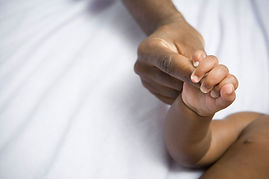Teething can happen before your little baby is six months old. Some babies will not begin teething until closer to 9-12 months. Don't be worried if it happens a little sooner or later, though. The time does vary from baby to baby, but we want to tell you about what to expect and give you some options for the best teethers to help with all the fuss.
Some signs that your little one is teething include having tender gums and drooling. If he/she is gnawing on yours or their own fingers, that is a definite indication also.
As your little's baby teeth are working their way to emerge, he/she might experience some discomfort. This causes irritability, a disturbance in sleeping, and excessive saliva. The excess spit is self-soothing so grab a bib and take it day by day. Sore, swollen gums can be relieved by cool spoon or teething ring. The gums might even look a bit red which is normal. Mayo Clinic also suggests rubbing the gums with a clean finger. Your doctor may recommend over-the-counter pain medications such as acetaminophen like Tylenol or ibuprofen (Advil, Motrin, others). Teething should not interfere with your child's eating or drinking.
While your child begins teething, you should run a soft, clean cloth over your baby's gums. Do this twice each day. Make it a routine after the morning feeding and before bedtime. This cleansing can keep food debris and bacteria from building up.
When your baby's first teeth emerge from under the gums, use a small, soft-bristled toothbrush to clean teeth twice a day. You can just use a smear of fluoride toothpaste. A little goes a long way since baby does not know how to spit. You can go up to a pea-sized dollop as your child approaches 2 to 3 years of age. The full set of twenty primary "baby" teeth will be evident by his/her third birthday.
Enjoy shopping your options of mobiles and if you are in need of a diaper cake, be sure to reach out to us to customize one to match your nursery theme. Happy shopping!



Comments